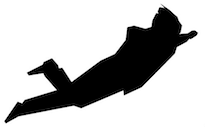'Proteus - who dwells in the margins, in the fecundity of the ecotone, of the borderland - is beyond sexuality, beyond gender, beyond race, beyond human, beyond animal, beyond plant, beyond element, beyond machine.... and yet resides within and through and between all these categories'
Protean Poetics
Aaron M. Moe
22 pages, 12x20 cm
ISBN: 978-87-998667-3-1
Designed by Fuchs Borst, printed by We Make It and bound by hand
Protean Poetics consists of 84 aphorisms spiraling around a 'protean nameless yeast permeating this thing called language.'
Aaron M. Moe is an assistant professor of English at Saint Mary's College, Notre Dame. Protean Poetics takes his thinking found in Zoopoetics: Animals and the Making of Poetry in new directions.
The publication is part of the Parapoetics Series, co-published with Laboratory for Aesthetics and Ecology, and with cover designs created by André Fuchs (Fuchs Borst), who works conceptually with patterns, translating geometries found in nature that follow fractal, aleatory and aperiodic structures.
The Parapoetics Series is an investigation into the array of possibilities and problems for a transspecies semiotics in various aesthetic modulations. Parapoetics exorcises the all-too-human quest for monopoly over voice, inscription, worlding. Parapoetics revises grammatical categories, pronominal demarcations, and experiments with alternative modes of (re)presentation within a 'we' of planetary proportions. Parapoetics insists on multispecies storytellings. Parapoetics asks: Who speaks, and on behalf of whom? How do nonhumans, ahumans, inhumans articulate themselves, and how can 'we' avoid the anthropocentric error of always measuring these articulations against the arbitrariness of human linguistic signs in order to find but an alleged absence or silence? As Wittgenstein pointed out, as long as our language remains the same, it will seduce us into asking the same questions over and over again. Parapoetics asks what other semiotic possibilities can be afforded to us. It asks how to speculate and engage in parallel vocabularies in unknown sign systems. Parapoetics challenges the ideas of what it means to signify, in what manner significations can manifest themselves, and what promises for our relations to Others a poetry in an expanded, transhuman field might hold.

